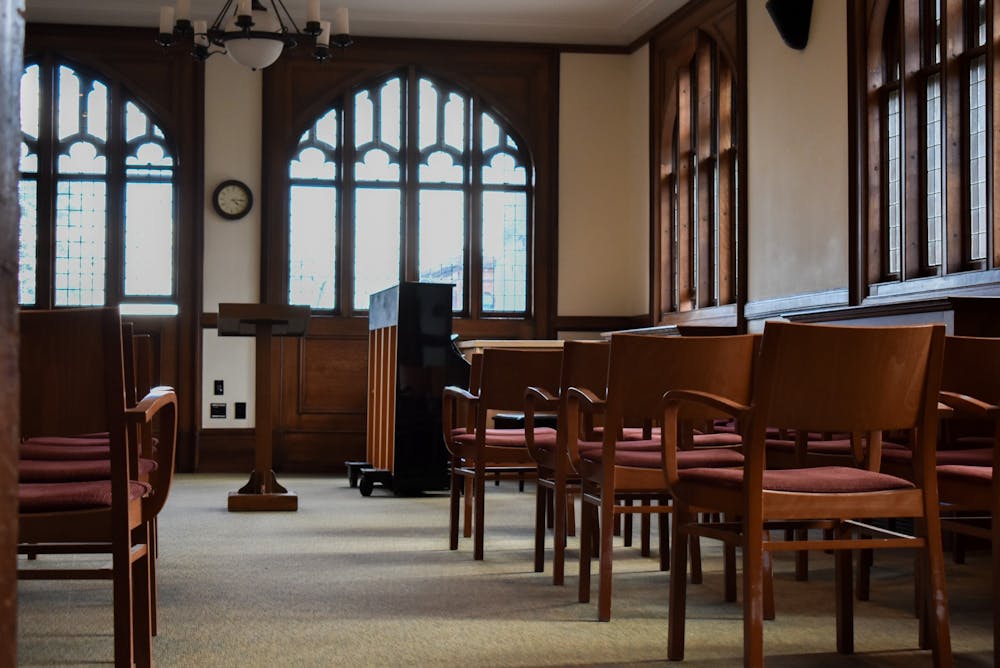A year ago, I called on the University to improve the experience for Muslim students during Ramadan. This Ramadan, there were marked improvements for Princeton Muslims thanks to the collaborative efforts of the Muslim Student Association, University Student Government, and Campus Dining.
For example, students this year were provided with insulated Suhoor bags from Campus Dining and a wide array of options like fruit juice, eggs, dates, frozen entrees, and fruit. Suhoor was available for pickup every weekday evening in Cafe Vivian. Whereas in past years students largely had to fend for themselves for iftar, this time, Muslim students were allocated $15 in the form of a meal swipe for iftar at Frist on weekdays and at the C-Store during the weekend. This new allowance for iftar enabled Muslim students to gather in the dining hall at the same time each evening for communal iftars, which are especially vital in a month that emphasizes community.
Additionally, the nightly Taraweeh prayers were also consistently held in Frist for the entirety of Ramadan, which marked an improvement from last year when they were held in different locations on campus. Campus Dining also sponsored one of the nine Muslim Life Program Iftars which are open to the greater Princeton community.
However, in spite of these noteworthy enhancements to the Princeton Ramadan experience, there still needs to be yearlong improvements made to the halal meat options at Princeton, as well as increased academic accommodations for students during both Ramadan and the holiday that follows it, Eid al-Fitr.
The fact that the University had different halal offerings during iftar this year like pepperoni pizza, tacos, chicken pizza flatbread, and barbeque chicken demonstrates that Princeton does have the capacity to increase halal options throughout the normal school year. There was also one halal entree during every Friday afternoon late meal in Frist. While appreciated, more halal options should be made available every day of the week. Currently, the only halal meat options offered on a daily basis at Frist and in the dining halls are the grilled chicken and the crafted burger. Halal meat is more difficult to obtain and can be more expensive than non-halal meat, but this should not stop Campus Dining from diversifying its halal meat options year-round.
Furthermore, I believe that the University should strongly consider bringing back the weekly halal menus that were sent out to the Muslim community last academic school year. Discontinuing these menus this year has placed the burden on Muslim students to determine which entrees would be halal or not. As students expressed in a news article written back in March, this led to many instances where students received conflicting information from dining hall workers stating that a specific meat used in a dish was halal while others claimed the opposite. Additionally, I have personally noticed issues in some dishes that are marked as halal but included wine, invalidating the halal status. A return of the weekly halal menus would make navigating the dining halls a much easier process for Muslim students.
Muslims have two holidays that we celebrate yearly, one being Eid al-Fitr, which comes at the end of Ramadan. While my professors were very accommodating and I was able to get a weekly Chinese exam moved, there were multiple students I talked to who had to rush from Eid prayer to an exam. It is simply unfair and completely unreasonable to expect any Muslim student to work on an assignment or take an exam on a major religious holiday. Although Dean of the College Jill Dolan did send out an email to all faculty at the beginning of the spring semester about accommodating religious observances, the email only mentioned weekly Jummah prayers and not Eid al-Fitr. Next year, Ramadan and Eid al-Fitr will take place in the spring semester again, so Princeton faculty need to be provided with more specific and detailed information about the increased worship Muslim students will partake in.
For example, many of us choose to participate in Taraweeh prayers during Ramadan, which are supplementary prayers offered at night, usually lasting from one-and-a-half to two hours. During the last 10 nights of Ramadan, considered the holiest nights of the year, the Muslim Students Association organized trips to the local mosque to participate in additional prayers between 2 and 5 a.m. Clearly, for the students who choose to increase their worship during Ramadan, in my experience the majority of Muslim students on campus, it will be difficult to get to morning classes on time. Providing professors with increased knowledge of what Ramadan entails and when Eid al-Fitr will take place will allow Muslim students to experience greater academic accommodations during future Ramadans.

Based on the recent Daily Princetonian Senior survey, Muslim students only compromise about 4 percent of the Princeton population. On a daily basis, we already have to navigate our religious commitments within a highly restrictive academic structure. The University must work towards these dining and academic improvements so that Muslim students will ultimately not be marginalized at Princeton.
Columnist Ndeye Thioubou is a sophomore from The Bronx, N.Y. She can be reached at nthioubou@princeton.edu.









